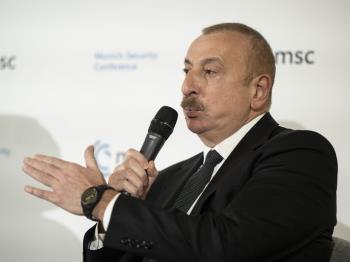Alwaght- While war has covered most of the Lebanese southern borders and clashes everyday elevate to new heights, diplomats believe that the ceasefire negotiations are not yet dead and they have managed to keep them alive and going.
Recently, the New York Times, citing some informed regional and American officials, talked about imminence of Lebanon and Israel striking a ceasefire deal.
According to the newspaper, the likely deal will be a 60-day ceasefire according to which Hezbollah will move to the north of the Litani River.
New York Times further reported, citing American diplomats, that Israel looks more interested in a deal in Lebanon than in Gaza.
The newspaper quoted American officials as saying that Israel believes the easiest way to return the displaced Israelis to the north is to reach a ceasefire agreement with Hezbollah, and therefore the negotiators hope that the temporary ceasefire will last for 60 days and become permanent under the Trump administration.
According to the newspaper, the agreement includes a new US-led mechanism to ensure that Hezbollah and Israeli forces remain outside the border area.
Meanwhile, the Israeli newspaper Yedioth Aharonot reported that estimates in Israel are that despite minor differences remaining unsettled, a ceasefire agreement with Lebanon will be announced in the coming days.
However, these optimistic estimates come at a time when the Israelis have been heavily pounding various areas of Beirut and its suburbs with airstrikes in recent days, and according to the occupation army, they have even used bunker buster bombs again, and according to eyewitnesses, large number of bombs containing white phosphorus have been dropped on Lebanon.
On the other hand, while Hezbollah leader Sheikh Naim Qassem said in a video speech on Wednesday that the resistance had presented its views on the proposed agreement and that Hezbollah's two conditions for the agreement include end of all Israeli attacks on Lebanon and the preservation of Lebanese sovereignty, reports indicate that the Israeli army is trying to create an impenetrable buffer zone along the border.
In this regard, Hashem Haidar, the head of the Southern Council in Lebanon, who was appointed by the Lebanese government to investigate the damage caused by the regime's attacks, told AFP that 70 percent of 18 Lebanese villages along a 120-kilometer stretch have been destroyed, which amounts to 45,000 houses.
One of the villages in this area is Meis El Jabal, which, according to Abdul Monem Shaqir, the mayor of the village, aims to turn the border area into a scorched earth. According to the AFP, in the village of Muhib, adjacent to Meis Al-Jabal, more than 84 percent of the houses have been razed to the ground.
Hassan Jouni, a retired brigadier general of the Lebanese army, in an interview with Al-Arabi said he believed the Israeli regime wants to increase its ability to monitor the border areas by destroying border villages and burning the surrounding forests and agricultural fields.
In defense of its barbarous actions, the Israeli army, without acknowledging the hidden goals of systematically destroying agricultural fields, forests, and rural houses, argued that it destroys the Hezbollah network of tunnels in the border area, especially in Nabatieh.
Although this situation has not reached a point of Israeli military establishment and occupation due to the continuous resistance of Hezbollah fighters, and the Israeli soldiers, like the fierce clashes of recent days over the occupation of the village of Al-Khayyam, are forced to retreat after each attack by the resistance forces, it shows the non-compliance to Hezbollah's conditions in the Israeli-favored ceasefire. In other words, the Israeli diplomats sound upbeat about a ceasefire while the Israeli army plans in southern Lebanon show such an agreement out of reach.
Two scenarios
There are two perspectives in explaining these Israeli contradictions. First, the deal mentioned by the American and Israeli media and officials rests on ensuring the maintenance of the Israeli regime's military superiority on the borders and imposing the condition of obtaining permission to violate Lebanon's territorial sovereignty and strengthening the quantitative and qualitative involvement of Western countries in the mission of the UN peacekeeping forces (UNIFIL). According to Kenneth Roth, the executive director of Human Rights Watch from 1993 to 2022, Tel Aviv seeks to diplomatically "tell Hezbollah not to shoot, but we will shoot periodically." He added: "This is a unilateral agreement, this is not a ceasefire."
Meanwhile, although an agreement under such conditions is completely impossible, Netanyahu wants to make a gesture of readiness for a ceasefire and a halt to the war. According to the Washington Post, Trump told Netanyahu the war has to be over by the time he takes office. "No conflict, no violence. He has to do something about it.”
It is also possible that Netanyahu and other Israeli officials are shocked by International Criminal Court’s arrest warrant to him and ex-Defense Minister Yoav Gallant, and worse, the announcement of support for the implementation of this ruling by some of Tel Aviv’s Western allies, and are seeking to make a gesture of readiness to stop the war and accept a ceasefire if security guarantees are provided, so that they can paint Hezbollah the factor behind fall of the ceasefire efforts if Lebanon rejects the terms of the agreement.
Meanwhile, there is a second perspective that sees the Israeli regime struggling to escape the war and secure minimal achievements on the political and negotiation areas. Therefore, the Americans, knowing the inability of the regime's military campaign to defeat Hezbollah, have taken into account the reservations of the Lebanese government and Hezbollah in the new ceasefire plan. And, meanwhile, the actions of the Israeli army in the southern villages of Lebanon are intended to gain leverage in the negotiations.
The New York Times reported that Israeli Prime Minister Benjamin Netanyahu is under pressure to return tens of thousands of displaced Israelis to their homes in the north, but Israeli officials have said that the settlers' fear of continuous Hezbollah attacks has prevented them from returning, and therefore only a ceasefire agreement can end the daily rocket attacks on northern Israel.
Regarding the mounting pressure on the displaced settlers and the few remaining in the northern areas, the Hebrew media in recent days have published reports of the endless nightmare and state of despair of settlers in the north, stating that the residents of the north live amidst warning sirens, missiles and drones and are constantly forced to go to shelters.
Roi Kais, a reporter for Yedioth Ahronoth, reported in this regard: "Most Israelis in the unevacuated settlements of the northern areas in the Western Galilee, including Nahariya, Acre and even Kerioth and Carmel, are in a constant state of terror and alarm and see no end to this situation."
One settler told Yedioth Ahronoth: “We are in constant pain and suffering, and even the dogs here have learned to run to the shelter themselves.”
Alert and running to the shelter have become part of their daily lives, and a constant question before them is: When will this nightmare end?
Meanwhile, new polls are also reporting an increase in the number of those who want a ceasefire agreement with Hezbollah, which is not good news for Netanyahu’s war cabinet’s military campaign. According to the results of this poll, 57 percent of Israeli society wants a political settlement with Lebanon, showing a 12 percent increase compared to last week’s poll.
The crisis within the armed forces and Hezbollah's military pressure in recent days have also added to the need for Tel Aviv to reach a ceasefire agreement more than the Lebanese. In this context, Axios published a report on Friday, referring to the unprecedented crisis in the Israeli army's Unit 8200, which is responsible for intelligence gathering for assassination operations, and citing former intelligence officers, called it the worst crisis in the force's history.
Also, Maariv newspaper reported on a similar crisis in the Golani Brigade, stating that the brigade, which includes the elite soldiers of the Israeli army and the backbone of its ground forces, has lost 110 of its members since October 7, 2023, the highest number of casualties among all infantry brigades.
"What worries us above all is the high casualties of the Golani Brigade in this war compared to other infantry brigades, while the Israeli army considers the Golani Brigade to be its red line," said an Israeli military correspondent.
Add to these crises the Hezbollah attacks using advanced new weapons that have given the movement a tangible boost to its military position in recent days. The attacks include the composed drone-missile attacks deep into Tel Aviv from a 110-kilometer distance from the border and also a strike on headquarters of the Unit 8200 in Tel Aviv suburbs, sending a resolute message amid ceasefire negotiations to the American mediator that in addition to Hezbollah defensive power against Israeli offensive, it has now established its offensive power by adopting the Haifa for Dahiya (suburbs of Beirut) and Tel Aviv for Beirut equation, and that Lebanon is not the side that needs negotiations more and perhaps Hezbollah will not take the negotiations serious and consider it a political tactic by the enemy to sow division in Lebanon and assess the resolve of Hezbollah in the war.



























